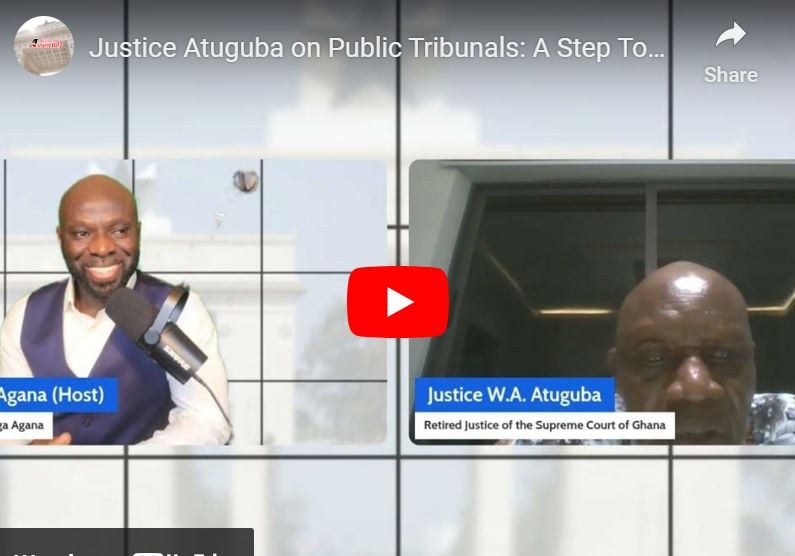Retired Supreme Court Justice William Atuguba’s insightful reflections on the potential revival of public tribunals in Ghana offer a nuanced perspective on a complex issue with historical and contemporary relevance. His commentary, shared on The Assembly podcast, delves into the controversial legacy of these tribunals during the Provisional National Defence Council (PNDC) era, highlighting both their perceived shortcomings and their effectiveness in addressing certain societal demands. Justice Atuguba’s careful analysis provides valuable context for the ongoing debate surrounding the potential reintroduction of these tribunals, a proposal recently championed by the opposition National Democratic Congress (NDC) and surprisingly echoed by Attorney General Dr. Dominic Ayine. This renewed interest in public tribunals necessitates a thorough understanding of their past performance and their potential implications for Ghana’s current democratic framework.
The crux of the matter lies in the structural and operational differences between public tribunals and traditional courts. Justice Atuguba points out that public tribunals, as constituted under the PNDC, comprised a mixture of legal professionals and lay members. This hybrid composition, while intended to broaden representation and incorporate community perspectives, was a major source of contention within the legal fraternity. Lawyers, adhering to established legal procedures and principles, often clashed with the more flexible and arguably less predictable nature of the tribunals. The inclusion of non-legal professionals raised concerns about the consistent application of legal principles and the potential for biased or arbitrary judgments. This fundamental difference in approach led to widespread boycotts by lawyers, demonstrating a deep-seated distrust of the tribunal system within the legal profession. Attempts were made to bridge this divide by allowing appeals to the National Appeals Tribunal, but these measures proved insufficient to fully allay the concerns of many lawyers who remained skeptical of the tribunals’ legitimacy.
Despite the controversy surrounding their composition and operation, Justice Atuguba acknowledges that public tribunals, particularly after the initial period of revolutionary fervor, played a significant role in addressing corruption and misconduct. He cites the high-profile case of the murdered high court judges and retired army officer in 1982, where public pressure demanded that the perpetrators be tried before a public tribunal rather than the conventional courts. This case illustrates the perception, at least among some segments of the population, that public tribunals could offer a more swift and decisive path to justice, particularly in cases of high public interest and sensitivity. This effectiveness, however, must be weighed against the concerns surrounding due process and the potential for politically motivated prosecutions.
The potential resurgence of public tribunals in contemporary Ghana triggers important questions about the balance between expediency and adherence to established legal principles. While proponents argue that such tribunals can offer a more streamlined and efficient mechanism for addressing corruption and other forms of misconduct, critics fear that they could undermine the independence of the judiciary and create a parallel system of justice susceptible to political manipulation. This concern is particularly relevant in a democratic context where the separation of powers and the impartiality of the judiciary are paramount. The reintroduction of public tribunals could create a perception, justified or not, of a politicized justice system, potentially eroding public trust in the rule of law.
The debate surrounding public tribunals in Ghana underscores the ongoing tension between the desire for swift justice and the need for adherence to due process. The historical context provided by Justice Atuguba reveals that while public tribunals may have played a role in addressing certain societal needs during a specific period, their reintroduction in a democratic setting requires careful consideration. The potential benefits of expedited justice must be weighed against the risks of compromising the independence of the judiciary and undermining the principles of a fair trial. Furthermore, any attempt to reintroduce public tribunals would require robust safeguards to ensure their impartiality and adherence to established legal norms.
Ultimately, the decision of whether or not to revive public tribunals in Ghana requires a balanced and comprehensive assessment. The historical experience, as recounted by Justice Atuguba, offers valuable lessons about the potential pitfalls and benefits of such a system. However, the current democratic context necessitates a fresh approach that ensures any such tribunals uphold the principles of fairness, impartiality, and respect for the rule of law. A thorough national dialogue involving legal experts, civil society organizations, and the public at large is crucial to navigate the complexities of this issue and arrive at a decision that best serves the interests of justice and democratic governance in Ghana.


